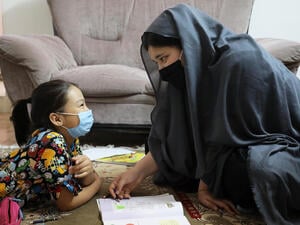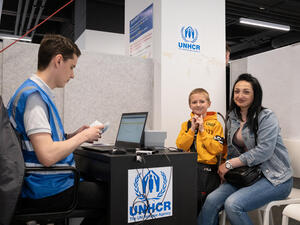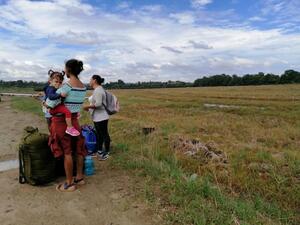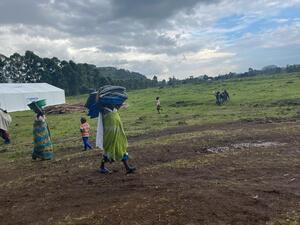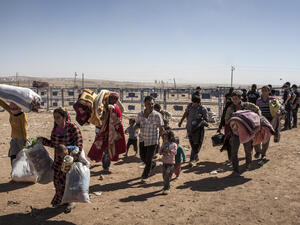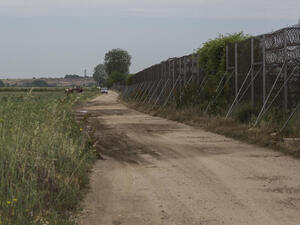Asylum seekers get rare chance to tell their stories in Brussels exhibition
Asylum seekers get rare chance to tell their stories in Brussels exhibition
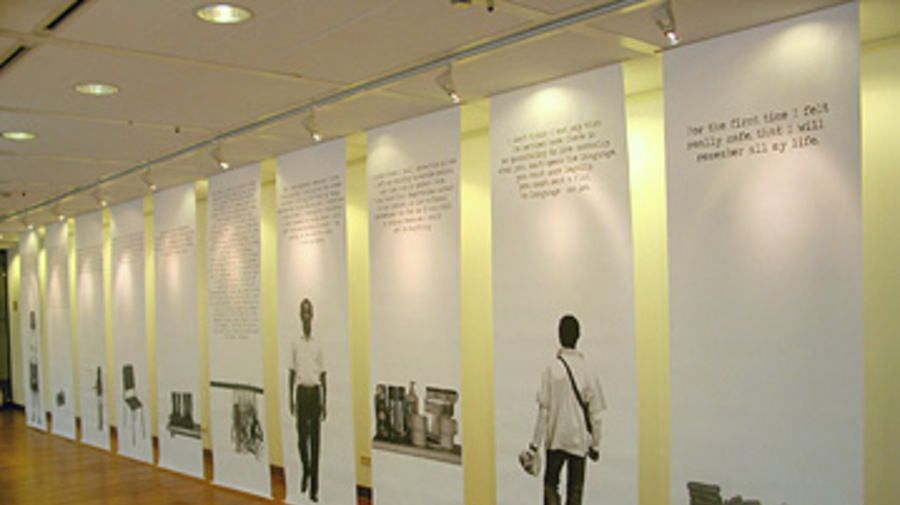
A selection of photographic prints by Joslin Towler hangs from the walls at the "Refugee Stories" exhibition in Brussels.
BRUSSELS, Belgium, November 9 (UNHCR) - A striking new exhibition and related website gives refugees a rare opportunity to tell Brussels-based policy-makers their stories of seeking asylum in the European Union (EU), which hopes to introduce a common asylum system by the end of the decade.
Organised by the European Council on Refugees and Exiles (ECRE) and artist Joslin Towler, "Refugee Stories" features photographs based on interviews with some 120 men and women who have sought protection in Europe over the last decade.
A powerful selection of their accounts can be read on a special website that was also launched here at Wednesday's exhibition, which is part funded by UNHCR. Refugees and asylum speakers spoke about their experiences in about a dozen EU countries, while popular Belgian comedian Pie Tshibanda - a former refugee from the Democratic Republic of the Congo - opened the exhibition.
"Refugee Stories gives voice to the voiceless," said Judith Kumin, UNHCR's representative in Brussels. "Far too often people in Brussels talk about asylum seekers and refugees without ever hearing from them directly. We applaud ECRE's initiative."
Towler said she started the project with little awareness about the concept of seeking asylum. "This exhibition is the result of an exploration through the eyes of refugees and asylum seekers. The pictures were taken on the streets of Brussels, in the occupied churches and in the Petit Château, a reception centre in Brussels. They reflect the backdrop to asylum seekers' existence: the institutional nature of their lives, their belongings."
The exhibit features people like 29-year-old Cecilia, who explains how she fled Sudan in 1995 after witnessing the murder of her family and now lives without any status in Belgium, fearful of being sent back to Khartoum. Or Roza, who fled Chechnya and was finally recognised as a refugee in Poland after her initial application was rejected - she was determined to integrate into Polish society and now works as a doctor.
The stories are based on interviews conducted earlier this year in Austria, Belgium, the Czech Republic, Germany, Greece, Hungary, Italy, Malta, the Netherlands, Poland, Spain and the United Kingdom. They are powerful, moving stories about gaining access to the EU and to asylum procedures. The stories document life in detention and reception centres and the challenges and opportunities of integration in Europe.
The exhibition comes at a time when asylum in Europe is under scrutiny; next year the European Commission will issue a Green Paper on its objective to create a Common European Asylum System by 2010. Yet those most affected have little say.
"The fate of refugees arriving in Europe is increasingly determined by decisions made in Brussels, but the voices of these men and women are rarely heard in the debates that are shaping the development of the Common European Asylum System," ECRE said on its website.
"ECRE urges those who play a role in political decision-making to listen to the voices of those who are most affected by their policies on asylum, and to create a system that offers genuine and lasting protection to those in need," it added.
It is a sentiment shared by refugees such as Prisca Agbor, a Cameroonian living in Austria. "It is really important that refugees have the opportunity to speak for themselves. I am looking forward to coming to Brussels, and telling my own story so others without a voice can be helped," she said in one of the interviews.
By Vanessa Saenen in Brussels, Belgium



